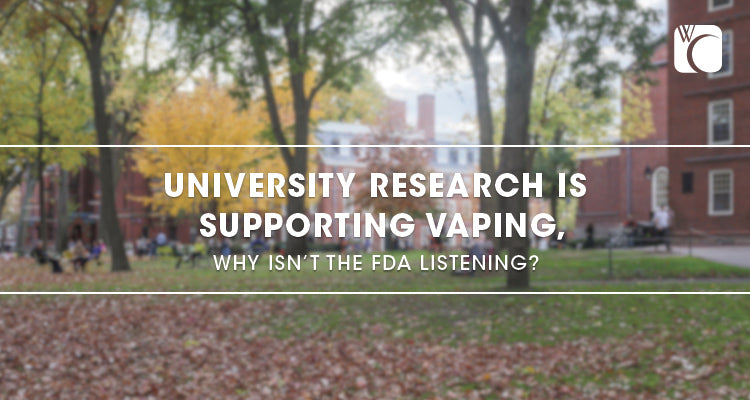Public support for e-cigarettes is growing as research keeps confirming what vapers widely feel should be recognized as fact. They feel vaping is safer than smoking, and e-cigs can help smokers kick their tobacco habit. Although university research and public health institutes around the globe continue producing new studies stating this popular opinion, the FDA is ramping up enforcement of e-cig regulations meant to limit the availability of vapor products across the country.
The FDA vs. Vaping

The FDA began regulating e-cigs as tobacco products in 2009, placing tighter restrictions on product marketing and sales to minors. Nonetheless, government surveys suggest that teen vaping is on the rise, which is why the FDA recently issued more than a thousand warning letters and civil penalties to retailers accused of selling e-cigs to youth. Additionally, five major e-cig manufacturers received letters demanding they provide plans for preventing minors from using their products. Depending on the outcome, flavored e-cigs could soon start disappearing from store shelves altogether.
University Research Shows Correlation Between Vaping and Smoking Cessation

Youth vaping is certainly an issue to be concerned about, but do e-cigs have value to adults who are trying to stop smoking? A study from the Washington University School of Medicine in St. Louis analyzed data collected from smokers between the ages of 22-44. The purpose of the study was to determine if vaping helped smokers reduce their tobacco use. The university research found that more smokers had either quit or attempted to quit since e-cigs became widely available. Researchers also found that smokers who tried vaping made more attempts to quit within the previous year.
Researchers at the University of California-San Diego noticed similar patterns within the same data set. The university research found that smokers who tried vaping were more likely to beat their tobacco addiction. Their conclusion found that “use of e-cigarettes was associated with a higher quit rate for individuals and the general population.”
Another study funded by the National Institutes of Health likewise concluded that “frequent e-cigarette use may play an important role in cessation or relapse prevention for some smokers.” Based on data from former smokers who quit between 2010 and 2015, researchers discovered that smokers who transitioned to vaping on a daily basis were three times more likely to quit tobacco than non-vapers even after controlling for other factors.

The evidence is in: E-cigs help some smokers quit tobacco. A sensible public health policy would encourage adult smokers to try vaping, which is exactly what the British Royal College of Physicians has been doing for the past few years. While the FDA has slowly changed its previously hostile stance on e-cigs, their latest actions suggest a tightening of restrictions.
The FDA and the Future of Flavored E-cigs
While admitting that e-cigs offer a lower risk alternative to smoking, FDA Commissioner Scott Gottlieb has stated publicly that the agency “won’t allow the current trends in youth access and use to continue, even if it means putting limits in place that reduce adult uptake of these products.” In other words, smokers could soon have fewer options to help them quit tobacco because a few bad actors are selling e-cigs to kids. The FDA continues to wage its war against vaping despite supporting findings from university research.
Everyone agrees that minors shouldn’t be allowed to buy e-cigs, which is why White Cloud uses an age verification system for our online e-cigarette sales. At the same time, adults struggling with tobacco addiction deserve safer alternatives to smoking. The more alternatives they have, the more likely they are to quit tobacco. The FDA is right to go after retailers who sell e-cigs to youth. However, it should be careful not to regulate flavored vapor products out of existence.








